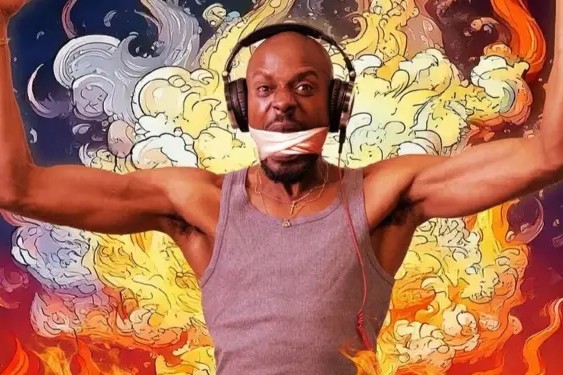Hackney-based pirate radio station ‘Blaze FM’ beats at the centre of this one-hour stage production of the same name, a pulsing exploration of music’s power to bind a community together in the face of systemic suppression and discrimination. Across its rapid-fire storytelling, the show charts the lives of those who founded and kept the station alive between 2012 and 2016: Hughbert (Andrew Brown), the station’s founder; his son Jason (Alexander Lobo Moreno) and daughter Aisha (Anais Lone); along with friends, rappers, and brothers Alpha (Aliaano El-Ali) and Pritstik (Marcus Reiss).
The story sweeps across a turbulent four years, covering the upheavals that shape the Blaze FM family. Court orders, redevelopment schemes, DTI raids, and systemic assaults on the Black music they champion form part of their struggle. Hughbert, the father figure in the community, faces renewed police scrutiny following new developments in the death of PC Keith Blakelock.
Alongside these personal battles, the production attempts to capture the wider shifts taking place across the country during the same period. The emergence of UK drill, the rise in knife violence, the lingering shadow of anti-Muslim reprisals, and the Brexit all cast their influence over the world in which Blaze FM exists.
Within the community, the narrative engages with themes of generational divides in activism, opposing visions for the relationship between politics and entertainment, and the constant tension between personal ambition and collective resistance through art. There are also moments of grief, marked by the loss of friends and allies. Yet the breadth of subjects competing for space presses heavily against the single hour of performance.
‘Blaze FM’ positions itself as more than just a show about music, asking pointed questions such as the double standards that pervade cultural gatekeeping. Violence in the art of Black and Muslim creators is too often condemned as glorification, while the same themes, when rendered by white artists, Quentin Tarantino is cited here, are rarely met with equal censure. These moments feel urgent, but the show does not explore them in depth. Such debates are frequently cut short by bursts of violence or hurried plot turns, and in trying to cover too much ground, the production loses opportunities for deeper reflection. As a result, emotional beats sometimes lose their force. Character transformations appear without the build they need, and certain transitions between scenes jar against the overall momentum of the story.
Visually, the set offers striking ideas. The tables and chairs are conjured from metal cages; and curtained blocks become projection surfaces for music videos and live drill broadcasts. These moving images lend the piece a dynamic texture, though the blocks themselves occupy so much of the stage that they restrict the performers’ movement, constraining the kinetic energy the story seems to demand.
Although many elements could benefit from more measured development, the vitality of the cast and the eclectic soundscape of Blaze FM keep the audience hooked from start to finish. In its best moments, it captures the exhilaration of a community speaking, singing, and fighting for itself, a reminder that even under threat, some frequencies refuse to be silenced.
‘Blaze FM‘ is at Pleasance Courtyard – Pleasance Two until Mon 25 Aug 2025 at 16:45


Comments